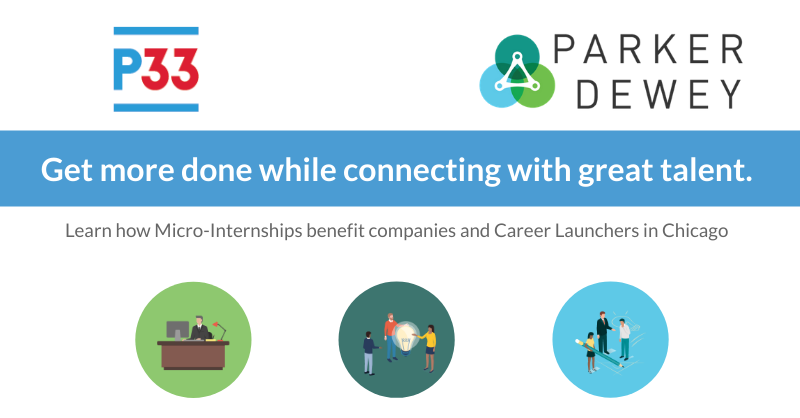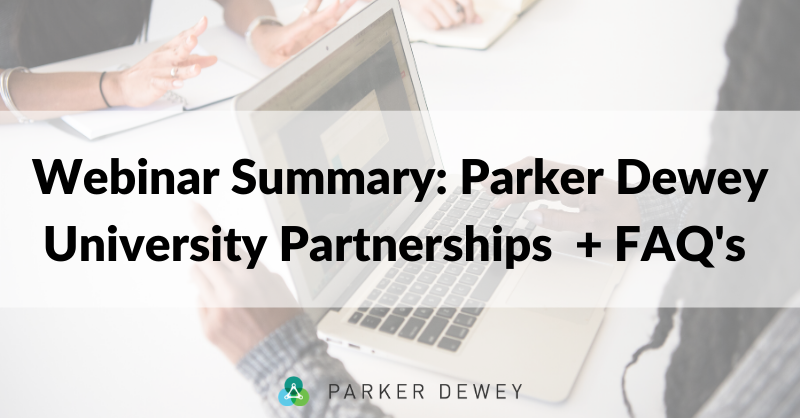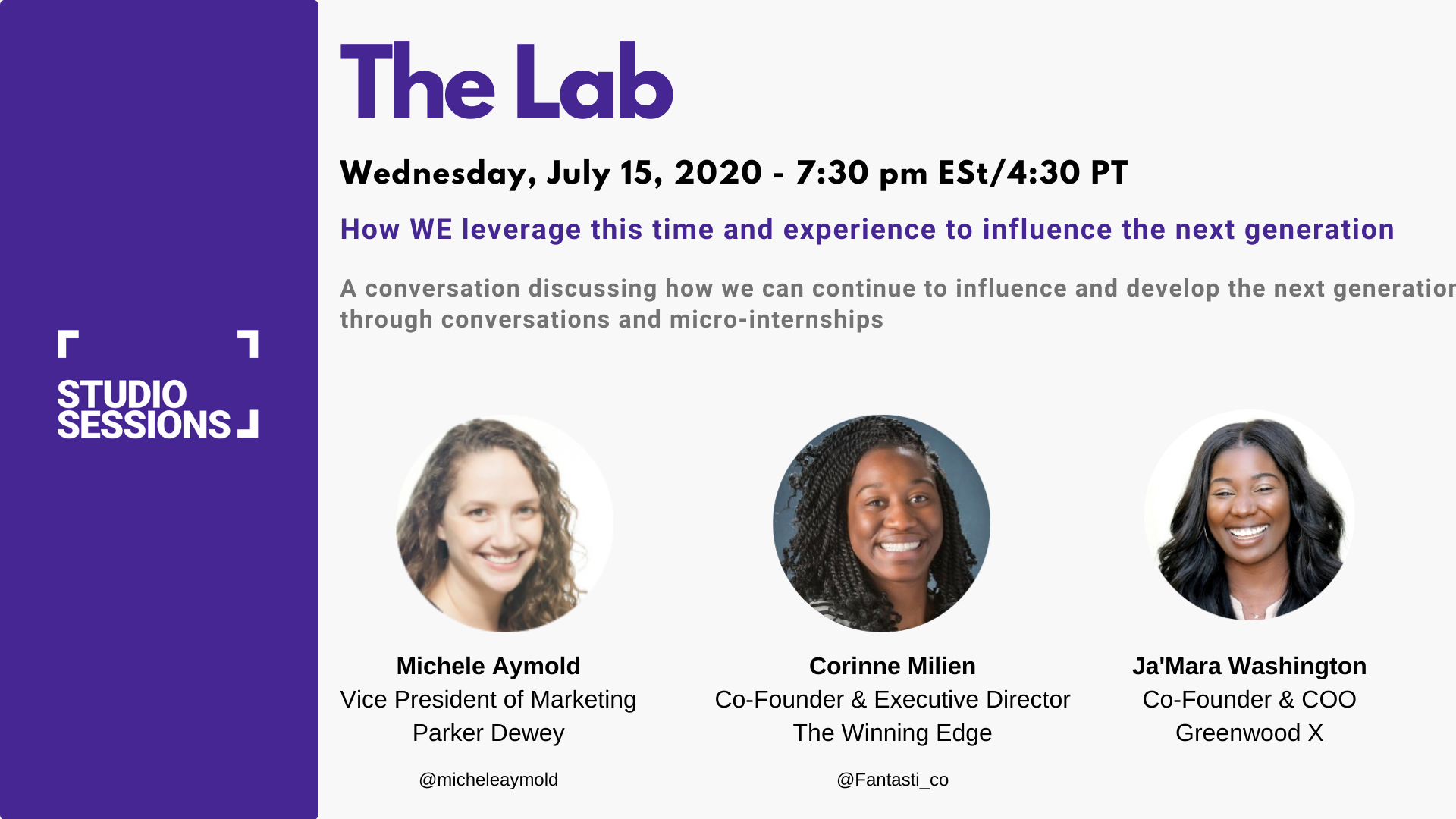.png)
Getting Earlier Access to Early-Career Talent
Campus recruiting is hard. Unlike recruiting for experienced professionals, early-career talent specialists spend time educating candidates not only on the benefits and working experience their organization provides, but also on the world of work at large. For college students with limited experience, understanding how classroom skills translate to professional duties and taking the time to explore career paths, roles, and industries is critical to making informed decisions as they launch their careers.
In a panel discussion moderated by Parker Dewey’s Partner Engagement Specialist, Danielle Rueger-Miroewski, Yonas Kemal, rising junior at the University of North Carolina at Chapel Hill, and Alison Keefe, Director of Emerging Talent at Smith+Nephew, share their experiences and perspectives on experiential recruiting targeting first- and second-year college students.
Whether it’s internships or career fairs, many organizations focus their recruiting efforts on upper-level students, but Yonas shares a growing trend echoed by 72% of college students: not only are highly motivated college students thinking about career plans and possibilities as freshmen and sophomores, but many are even considering their career prospects in high school.
Why engage college students prior to junior or senior year?
Yonas explains that he and his peers see traditional 10-12 week internships as a stepping stone to launching their career—not a bad or incorrect way to think about these opportunities he emphasizes—but Micro-Internships provide a better first step by encouraging students to focus less on the future career potential and more on the present opportunity to learn and explore. “I think it’s just as important to know what you don’t want to do or where you don’t want to be.”
For Alison, recruiters can benefit from supporting career exploration as well. She shares,
“As a company that not a lot of people know, it helps to give us brand recognition with a population of college students really early on that’s eager to learn, can learn more about us in terms of being a technical company, and we’re excited to bring in those people that are independent thinkers–that’s another reason why we like having freshmen and sophomores involved–and then it’s our future talent pipeline, for not only internships but also for full-time roles.”
What are the benefits of Micro-Internships for first- and second-year students?
Yonas shares, “A lot of what I learned outside of the classroom might be a little more important than what you can learn in the classroom […] The experiences were amazing. It opened up a ton of awareness for me about different career paths that I might have otherwise spent an entire summer or class trying to dive into.”
Alison expands on how supporting career exploration and career development supports her recruiting efforts, “[for early-career hiring] it’s less about experience and more about skill set and characteristics [...] Someone who’s open to learning is critical to us, and that’s who we strive to hire in that first and second year, to pull through to their junior and senior year and then to full-time.” Those skills and characteristics, she says, are easily evaluated via Micro-Internships, regardless of the project deliverable or department the project is completed for.
Micro-Internship outcomes for college students and recruiting
Beyond completing the project and gaining a meaningful experience for his resume as a college sophomore, Yonas also utilized his Micro-Internship to expand his professional network and learn more about a career path he was curious about. Following his experience, he ultimately pivoted his career plans. “I got to learn so much about how the company was made, why they created it, how they actually manage it day-to-day, where they get some of their best ideas, how they manage their team [...] That relationship, the information I got from it, that has pivoted my career and where I want to focus and what I plan to do post-grad.”
“You only have 20 hours, you learn pretty quickly about a company. There’s no formal training, you’re picking up as you go and building those relationships on fast forward.“ - Yonas Kemal, rising junior at the University of North Carolina at Chapel Hill
Alison also shares how a single project can be the beginning of a relationship with a candidate that leads to full-time employment: “We’ve had Micro-Interns work on specific projects throughout the summer, so we built upon a first project and we added two additional projects for some of these students. It was from there that we found that these students really cared about the work they were doing, were driven, were very excited about working for a company that helps people each and every day. We felt like being able to hire someone after having the opportunity to work with us in 20 hours increments really gave the opportunity for them to interview us as much as it gave us the opportunity for us to get to know them.”
“We actually had students that we found through the Parker Dewey platform that we would never have gotten from our traditional way of recruitment.” - Alison Keefe, Director of Emerging Talent at Smith+Nephew
How Parker Dewey supports emerging talent and hiring organizations
With the majority of college students exploring career options earlier than recruiters are marketing opportunities to them, the impact of these efforts is limited as students have often established their preferences. As a result, waiting to expose opportunities to juniors and seniors causes companies to miss out on talented early-career professionals eager to employ their skills and be an asset to your organization.
“The partnership with Parker Dewey is a way to increase your equity, to have the opportunity to interact with students from all over the United States that may not be able to participate in normal internships. It gives us the opportunity to look for diversity outside of the target schools that we have. And it gives us the opportunity to be flexible and to really have such a great way for us to meet students like Yonas! There are a lot of great students on this platform that I think it provides them the opportunity to learn about themselves, learn about different types of companies, start to ‘try before they buy,’ and develop some skills along the way.” Alison Keefe, Director of Emerging Talent at Smith+Nephew
“From the student’s perspective, I think there’s a stat out there where 40-50% of students graduating will go into banking, finance, or big tech—and that’s usually because those companies have big programmatic internships and that’s really what’s in the students' faces. That’s all we see. Parker Dewey opens up the door to thousands of companies we may not have known existed, let alone know they offer opportunities for us.” - Yonas Kemal, rising junior at the University of North Carolina at Chapel Hill
College students are passionate about finding the right role and Micro-Internships provide a meaningful opportunity for organizations to brand themselves as a top-tier employer and a desirable workplace for students looking to launch their careers. Watch the full webinar replay conversation between Danielle, Yonas, and Allison, and download our most recent Student Sentiments on Campus Recruiting report.




